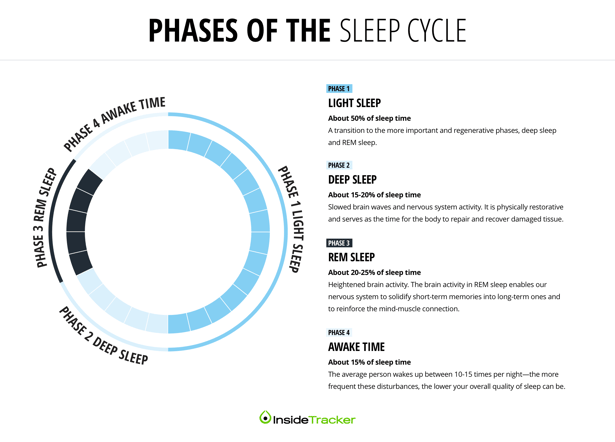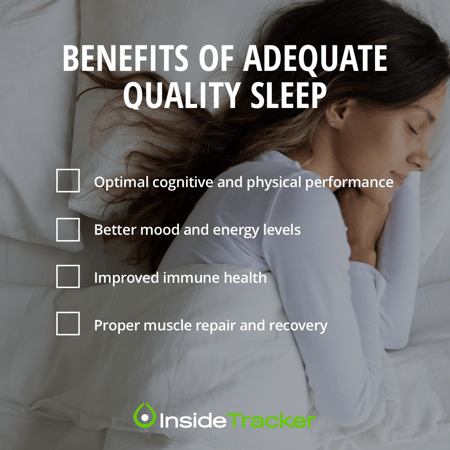![]() Athletes are always looking for ways to improve performance and take goals to the next level. Efforts for doing just that are often limited to waking hours: nutrition, hydration, recovery protocols, supplement routine and, of course, training itself. And despite all this, research shows that, on average, athletes neglect a critical performance tool: sleep. So how does inadequate sleep affect athletic performance? Interestingly, the oversight of sleep can impact performance, both directly and indirectly, and the effects largely differ by sport.
Athletes are always looking for ways to improve performance and take goals to the next level. Efforts for doing just that are often limited to waking hours: nutrition, hydration, recovery protocols, supplement routine and, of course, training itself. And despite all this, research shows that, on average, athletes neglect a critical performance tool: sleep. So how does inadequate sleep affect athletic performance? Interestingly, the oversight of sleep can impact performance, both directly and indirectly, and the effects largely differ by sport.
The impact of sleep quality on overall health
Before moving into the impact of sleep on performance, it is important to understand how sleep affects overall health and wellness. Both the amount and quality of sleep impacts our mood and energy levels, our metabolism, and immune system health.
Inadequate quality sleep can be linked to a variety of serious health problems, including an increased risk of depression, obesity, type II diabetes, and cardiovascular disease. It can even increase an individual’s risk for illness and infection.

Athletes as a population do not get adequate sleep, contributing to overtraining syndrome
Adequate rest and recovery are considered key components of improving athletic performance and preventing sleep disturbances commonly reported in overtraining syndrome. Sleep provides the body with an opportunity to rest from both the physiological and cognitive stressors many athletes face throughout the day. However, despite the body of evidence on the benefits of sleep in athletes (and the potential for sleep to alleviate fatigue), sleep duration and quality are often neglected by athletes.
It is well-reported that, on average, athletes do in fact get less than seven hours of sleep per night, often of poor quality. This falls below the recommended eight hours to combat the negative effects of sleep deprivation. Despite some research limitations, the British Journal of Sports Medicine consensus statement on the topic states that sleep deprivation does affect recovery, training, and performance in elite athletes and that these athletes as a population do not get enough sleep.
Athletes are, in general, a highly motivated group—the type of people who may willingly restrict sleep to fit more activities into waking hours. But even if you’re someone who ‘gets by just fine’ on a restricted sleep schedule, such a lifestyle can have immediate detrimental effects; evidence shows that restricting sleep to six hours per night for just four consecutive nights can impair cognitive performance and mood, glucose metabolism, appetite regulation, and immune function.
Effects of sleep deprivation on different types of athletes
Before we jump into the research of the effects of sleep deprivation in athletes, a disclaimer: Despite the recognized importance of sleep in athletes’ routines, the research on sleep in athletic populations is sparse at this time. The available research on this topic has specific limitations, including the underrepresentation of female subjects, inconsistent research methods across studies, and small sample size.
Now, the science. Current research does show a number of potential performance implications of poor sleep that should be considered in both endurance and power sport athletes. Among the subjects that have been studied, individual sport athletes appear to be more susceptible sleep deficiency and had poorer sleep efficiency than their team sport counterparts.
Two main detrimental effects of sleep deprivation on performance in all sport types are cognitive impairments and mood disturbances. Blumert et al. looked at the effects of just 24 hours of sleep deprivation in collegiate weightlifters (so, for a single night’s sleep). While they saw no difference in performance tasks, training load or intensity, there was a significant difference in mood state including fatigue and confusion in the sleep deprived athletes.

There are also observed direct effects of sleep deprivation on physical performance. Oliver et al. studied endurance running performance in a 24 hour sleep deprived state and found that that subjects who were sleep deprived ran fewer miles in the same amount of time as well-rested athletes but with the same perception of effort.[8] Athletes should also be mindful of the non-direct consequences of sleep deprivation on their performance including but not limited to metabolism, hormone regulation, immune health, and limiting recovery.
Much like everything related to health, wellness, and performance, each individual will have different sleep requirements. These requirements may also vary depending on phase or training season, sex, training volume, intensity, and type of sport.
Biomarkers related to sleep and performance in athletes
Adequate sleep helps to regulate cortisol levels, and inadequate sleep can cause cortisol levels to rise above optimized levels. Cortisol is a catabolic steroid hormone that breaks down muscle, so chronically-elevated cortisol can directly combat progress to become stronger or faster in our athletic performance.
Sleep also helps to regulate testosterone levels. This hormone is anabolic, meaning it helps build muscle (the opposite of cortisol). But, as you might have guessed, insufficient sleep can reduce testosterone levels.
Research shows that sleep deprivation can also cause chronic inflammation, as indicated by high hsCRP levels. As athletes, inflammation and muscle damage are to be expected with any sort of training—after all, we need to cause slight damage to our muscles to make them stronger. But chronic inflammation, the kind that’s caused by overtraining or insufficient rest, can leave an athlete prone to poor performance, illness, and injury.
Actions for athletes to take to improve sleep
While the benefits of adequate sleep are well-documented in healthy individuals, the research specific to athletes and different athlete types continues to emerge. That being said, there are well-established actions you can take right now to improve your sleep. Here are some actions to optimize your sleep habits:
- If you have trouble getting the recommended amount of sleep at night, consider taking regular naps.
- Begin tracking your sleep with a wearable activity tracker. While research has displayed varying accuracy of these devices for sleep management, they can help you establish a healthy and regular bedtime routine.
- Work on implementing good sleep habits or a bedtime routine that reduces stress and promotes a good sleeping environment.
- Consider adjusting your exercise routine and incorporate more rest and active recovery in times of sleep deprivation or high life stress to help support your overall health and prevent injury or illness.


